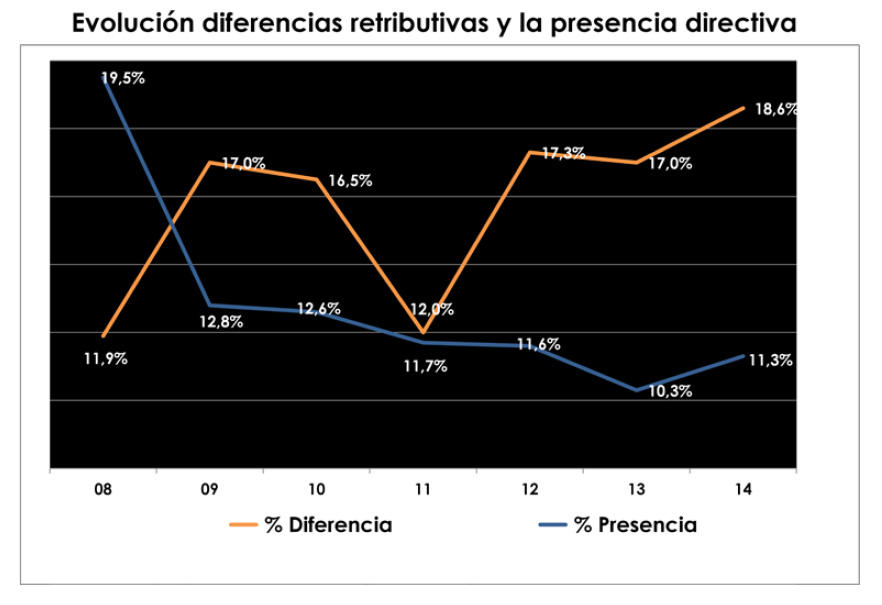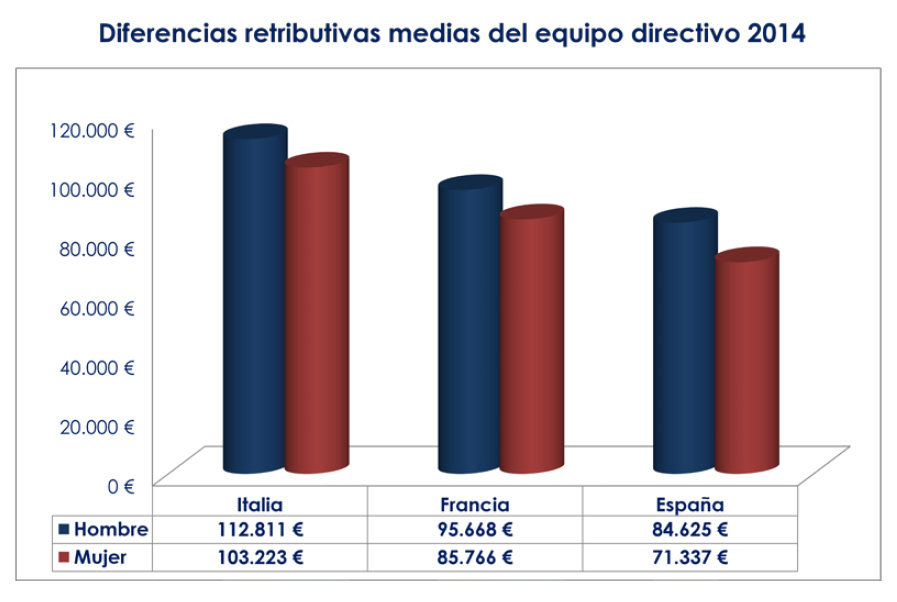Presentation of the 8th report on gender differences in earnings
Although the presence of woman managers has increased two-sided female discrimination still persists.
- The crisis has resulted in a perverse equation for women: more inequality as far as earnings are concerned and a smaller presence in management posts.
- Men managers earn 18.4% more than their women counterparts, one point more than in 2013.
- In contrast with our neighbours, France and Italy, Spain offers one hopeful piece of data: the number of women in management posts has risen by 1.4 %
_retoc.jpg)
Barcelona, March 7th 2014- Despite a very slight improvement in the percentage of women managers, Spanish women continue to suffer from double job discrimination. They receive lower pay in all professional categories and come up against difficulties when it comes to accessing better paid management positions. More specifically, the presence of women in the best paid management posts (General Management and Commercial Management) stands at somewhat below 9%. This data is featured in the 8th annual report on Men’s-Women’s earnings differences presented today by EADA and ICSA. The study was based on a sample that features salary data for over 80,000 employees in Spain, gathered via surveys and online platforms such as www.cuantomepagan.com
Women hold 11.7% of management posts in Spain, a slight increase from 10.3% in 2013, the year which marked the bottom of a continuous downward trend from 2008 onwards, when the percentage of women managers was almost 20%. However, the pay gap has risen by the same proportion to 18.6%, up 1.6% on the previous year. In absolute figures the current average annual earnings of male managers stand at 84,625 euros per annum whereas their female counterparts earn 71,337 € on average. As you can see from the graph a perverse combination or equation has emerged over these years of crisis whereby the crisis=fewer women in management posts plus a larger pay gap.

In the remaining professional categories the difference in earnings between the sexes is very similar to that of previous years: 10.6% in middle management posts (36,368 € as opposed to 32,883) and 13% for employees (22,402 € compared with 19,823). Similarly the presence of women in these posts has remained stable. Women hold 24.7% of middle management posts and account for 43% of the total number of employees in the country.
According to Ernesto Poveda, president of ICSA Grupo and director of the report, the report’s findings confirm that among the working population women have been most adversely affected by the crisis, although he sees the slight increase in the presence of women in management posts in a positive light. “Although it is still early to say” he points out “this might mean a change in trend. As we have seen over these last years, the economic downturn has been especially hard on women. The first signs of recovery could bring us back to ratios of greater equality”.
According to Dr. Aline Masuda, an EADA professor and collaborator on the report, the findings are very closely related to the deep economic crisis which “brought back conservative, more masculine management models; we went back to ‘control’, and to rigidity, to absolute availability. In such an environment women stand to lose out because they value other aspects such as conciliation and flexibility”. Masuda also thinks it is a mistake to return to the past when companies with the highest success rates today such as Google or Facebook for example, base their work philosophy among other things on flexible and creative models and shy away from rigidity and control.
Our neighbours: France and Italy
As in previous editions this earnings report analyses the differences in earnings with neighbouring countries, France and Italy. The comparison is frankly negative for Spain as far as earnings are concerned. In absolute numbers, Spanish female managers are the worst paid and the pay gap with their male counterparts is greater. As regards women’s presence in management, these countries have also witnessed a decline since the beginning of the crisis. The percentage of women managers has dropped from 13.9% to 11.7% in France and from 8.8% to 7.1% in Italy.

